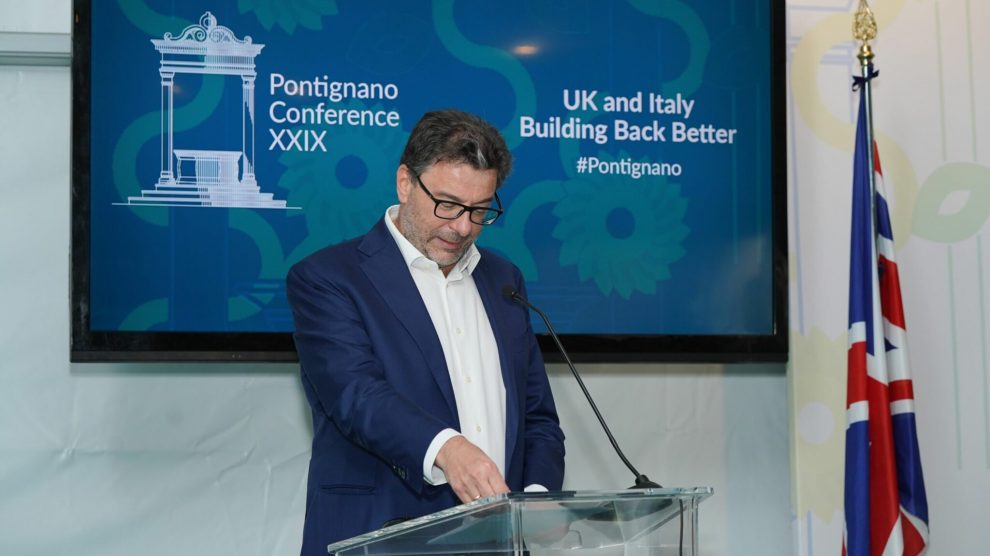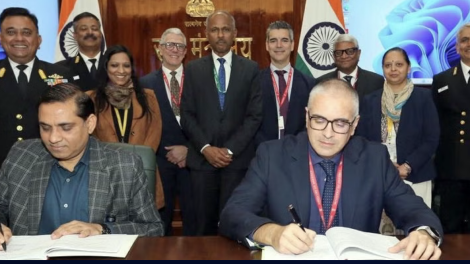Yes, the Silk Road has arrived in Rome and not in London – and that is no small matter. But the British approach towards China somewhat resembles Italy’s, especially since Mario Draghi became Prime Minister: business with the People’s Republic of China is welcome, but it is the right and duty of the United Kingdom (and Italy) to set up defences meant to protect national sovereignty and democratic values, especially when it comes to emerging technologies.
This much transpired from a panel attended by Giancarlo Giorgetti, Italian Minister of Economic Development, and John Glen, Economic Secretary to the British Treasury and Minister of the City (i.e. the financial sectors). The two were attending the XXIX Pontignano Conference, the most important appointment on the Anglo-Italian agenda, organised by the British Embassy in Italy and the British Council.
In a way, it’s the end of a golden era for both countries. This is how the relationship between the UK and China was described when former British PM, David Cameron, was lodged at 10 Downing Street. The relationship between Italy and China has been very much alike over the past years, blossoming with the signing of the Memorandum of Understanding on the Silk Road in March 2019 and steadily withering since then.
London elected to ban Chinese 5G last summer, whereas Rome is still grappling with this issue – to the alarm of allies such as the United States, according to which Chinese companies (namely, Huawei and ZTE) pose a security threat by conducting espionage on behalf of the Chinese government.
Minister Giorgetti has dealt with fifth-gen networks since two governments ago, as undersecretary to the PM. It was him who pushed to strengthen the so-called Golden power legislation (i.e. State intervention in the dealing of private businesses for national security’s sake) with regards to 5G networks.
Since 2019, Italy has placed several restrictions on Chinese 5G companies. President Draghi is trying to reassure his allies by supporting the need to diversify suppliers at the tune of roughly one Golden power decree per month.
The British government is also grappling with an issue concerning national security, one that’s reminiscent of a recent Italian episode: the not-so-isolated Alpi Aviation case, concerning the drone-making company that was acquired by two Chinese state-owned companies through “opaque methods” according to Italy’s financial crime corps.
Similarly Kwasi Kwarteng, the UK’s Secretary of State at the Department of Business, Energy and Industrial Strategy, has ordered the Competition and Markets Authority to look into the planned acquisition of Perpetuus Group, a small Welsh producer of graphene (with 14 employees and an annual turnover of £479,000, as of March 2020), at the hands of Taurus International or any company associated with Dr Zhongfu Zhou, who is featured as a “Chief Nanotechnology Scientist” on the Taurus International website, which boasts important business interests in China .
The Italian case could help the British investigations. In fact, the similarities are striking: 75% of Alpi Aviation was acquired in 2018 by a foreign company in Hong Kong (Mars Information Technology Co), which was set up ad hoc shortly before the operation and is ultimately attributable to two Chinese state groups.
According to Companies House Taurus International was founded a few months ago, in October 2020: the offices are registered as a two-family house in Lewisham, in Southeast London, and there is only one owner, one Victor Gembala, who is particularly active in the real estate sector.
These episodes shed light on how, and to what extent, Italy and the United Kingdom must endeavour to face the Chinese aims on their industrial jewels. Perhaps by forming a common front, learning from the experience of others, precisely in the name of the shared values that were evoked during the meeting in Pontignano.





